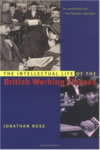The Intellectual Life of the British Working Classes
Young historians learn quickly that some excellent and important questions cannot be answered because nobody made records of things which, once, everybody knew. Now, no one knows, and we seem to have no way of learning.
Jonathan Rose sets out to ask one of these questions: what did Victorian working-class people -- miners, servants, factory girls, pickpockets -- like to read? And what did they think about it? We know what the professors and critics read, but what about poor kids in Welsh coal towns?
This brilliant and astonishing book poses an unanswerable questions and then proceeds to answer it thoroughly, precisely, and sympathetically. Though working people did not write literary criticism, they did sometimes write journals and diaries and autobiographies. Rose has read most of the roughly 2000 memoirs that survive. He examines library records to find what working class libraries purchased, how they chose their collections, what books were borrowed and which sat on dusty shelves. He looks at bookselling and magazine publishing for clues about what people liked -- and what they thought of it. He explores the records of schools and mutual-improvement societies and lecture series, the schedules of concert halls and policy debates of radio networks. Rose finds a wealth of evidence where it seems none could exist, and sorts that evidence carefully.
Above all, Rose is always vigilant to discover what people actually thought and how they actually responded to things they read. It is easy to imagine how working people must have responded to advertising and propaganda, but such imaginings often turn out to be contradicted by the evidence. Unschooled people, it seems, were surprisingly intelligent consumers of advertising and propaganda; they were happy to extract things they wanted and to reject messages they disliked. The treacly literature of girl's magazines, for example, had less impact on girls' education than might be imagined because girls overwhelmingly read (and preferred) stories for and about boys. The racist imperialism of so much bad Victorian fiction seems to have little impact on workers until very late; miners and navvies adored Uncle Tom's Cabin and, even though Labor papers generally sided with the Confederacy, workers themselves identified the cause of the South with the cause of the Bosses.
Rose shows the intellectual roots and reasons for tendencies we can easily see in fiction, but which seem arbitrary and inexplicable. Why were poor people so culturally conservative? Why, in particular, did they so strongly dislike the moderns and the Bohemians? This tension forms the background of many familiar stories, from Howard's End to Upstairs Downstairs and The Remains of the Day; Rose explains it. Small-town religious anxiety over sexual mores plays a smaller role, and the class consciousness and snobbery of the leading moderns a larger one, than I would have anticipated.
